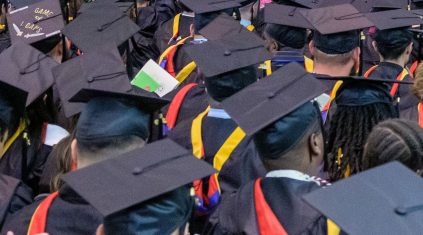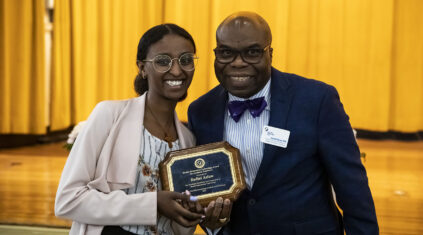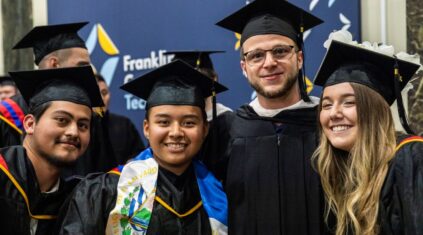
College Receives NSF Grant to Redesign, Launch Project-Based Learning Curriculum
November 20, 2023
Benjamin Franklin Cummings Institute of Technology today announced that it has received funds from the National Science Foundation (NSF) EPIIC grant to redesign and launch its project-based learning model across the college’s various educational programs.
Franklin Cummings Tech, Boston’s only non-profit technical college, received $399,996 to create comprehensive curricula that include skill-focused, project-based learning methods. Through collaboration with existing and new industry partnerships in sectors including engineering technology, biotechnology, computer technology, electrical engineering, business management, and construction management, the college will design curricula that align directly with the workforce requirements and allow students to learn through a real life project-based learning model to enhance the experience in the classroom.
“The transformative education provided at Franklin Cummings Tech requires constant recalibration to ensure our faculty are continually providing students with the hands-on, applicable skills to become invaluable members of the workforce,” said Dr. Aisha Francis, president and CEO of Franklin Cummings Tech. “We thank the National Science Foundation for generously supporting our efforts to redesign and enhance our approaches to teaching today’s technologies to a multi-generational student base so they can access well-paying careers.”
In addition to faculty professional development and curriculum design to center student engagement, the grant will facilitate deeper corporate sector feedback through program-specific Industry Advisory Boards where volunteer experts provide input on course content.
“The funds from this grant will further equip the faculty and staff at Franklin Cummings Tech to understand the needs of the industries and therefore provide the hands-on training students need to enter the workforce as skilled, career-ready graduates,” said Dr. Marvin Loiseau, dean of Academics at Franklin Cummings Tech. “Our industry partnerships are a powerful driver of the educational offerings required to keep our curriculum modernized and relevant, so graduates can make an immediate impact when they enter the workforce.”
Research indicates that the benefits of project-based learning curricula in undergraduate programs include a deeper understanding of content knowledge, development of effective interpersonal communication skills, enhanced creativity, and established ability for teamwork. Several studies have shown that project-based learning facilitates greater engagement with course contents as well as improved critical thinking among undergraduate students.
Franklin Cummings Tech recently launched its Center for Energy Efficiency and the Trades (CEET) and Center for Computing and Interdisciplinary Technology (CCIT), intended to provide affordable, high-quality programs to expertly train untapped and diverse talent for high-paying roles in industries where hiring demand far outstrips supply. Programs offered through the Centers provide a pathway to economic security for students and their families and build a diverse pool of talented workers.
Facts of Franklin Cummings Tech’s student population:
- 76% of the students at Franklin Cummings Tech are students of color
- 42% of the students at Franklin Cummings Tech are first-generation college students
- The median salary for alumni one year after graduation is $51,700
Support for the redesigned project-based learning curriculum comes as the college prepares to move into a new, state-of-the-art campus in Roxbury’s Nubian Square. The new three-story, 68,000 SF building will include technical labs and a rooftop learning lab to support the school’s hands-on learning with access to rooftop HVAC systems, photovoltaic (solar electric) panels, and roof-mounted wind turbines. Across the street from the campus, students will access the Nubian Square Life Science Training Center, housed at Nubian Square Ascends, for hands-on training as part of the school’s associate degree in Biotechnology developed in partnership with Ginkgo Bioworks.










